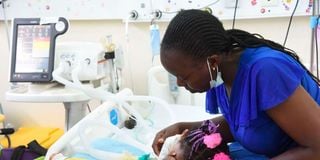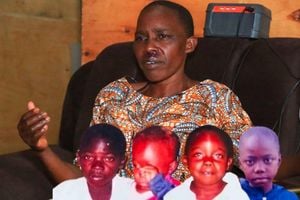Living on borrowed breath:The story of Baby Blessing

Doreen Alusa from Likuyani in Kakamega County attends to her four-year-old daughter at Moi Teaching and Referral Hospital’s Intensive Care Unit in Eldoret town, Uasin Gishu County on March 6,2024. The baby is battling a condition known as chronic spinal muscular atrophy.
What you need to know:
- Born with a genetic condition that has weakened her muscles, Baby Blessing has to rely on a ventilator to breathe.
- Her mother is keeping hope alive even as doctors say she will need support for the rest of her life
Amidst the hustle and bustle of Moi Teaching and Referral Hospital’s Chandaria Wing in Eldoret, life support machines beep faintly. Families gathered here engage in hushed conversations. The quietness reminds one of the fragility of life.
Within the sterile walls of one of rooms in the Intensive Care Unit (ICU) lies a remarkable tale of unwavering courage and a celebration of life. A life of milestone upon milestone. But also of a tough battle with illness.

A ventilator which Baby Blessing uses at Moi Teaching and Referral Hospital’s Intensive Care Unit.
Today, March 19, Baby Blessing Salayai is turning a year older. This is Baby Blessing’s fourth birthday. Like her previous three, she will be celebrating this one in ICU. It is in this room that has become her home and life that the Healthy Nation team is meeting this young and resilient soul who has defied odds to live.
Blessing is battling a condition known as chronic spinal muscular atrophy (SMA). This is a genetic condition that causes muscle weakness and atrophy of the muscles (where muscles get smaller). SMA can affect a child’s ability to crawl, walk, sit and to control head movement. Severe SMA can damage the muscles used for breathing and swallowing.
Since her admission to the hospital in January 2021, she has never stepped out for some sun or play. Her movement is dictated by the circumference of cables transmitting life support from the machines to her organs. This network of cables goes through her mouth, throat and tummy to assist in breathing and feeding.
But beyond the tubes and wires that tether the baby to life-sustaining equipment, a world of triumphs exists. From learning to communicate to achieving physical milestones, each step forward for this baby has been a victory against odds. At the heart of these milestones is a team of dedicated therapists and doctors.
Blessing’s mother, Doreen Alusa, says her child’s life has been a journey of medical complexities and a rollercoaster of emotions for the family. What began as a routine medical visit soon spiralled into an unforeseen journey, leading them to the threshold of the ICU where they would be staying for years.

Doreen Alusa, Baby Blessing’s mother, during the interview.
For a mother dealing with the unimaginable prospect of life in ICU for her child, Doreen finds solace and strength in her daughter’s steady development. From the initial shock to the gradual acceptance, love for her daughter keeps her going.
“Today, we are celebrating her fourth birthday. This ICU has been our unexpected venue for birthdays. We have transformed this environment into a haven of celebrations.’’
And true to form, gifts, cake and other refreshments are overflowing as the hospital management joins in the celebrations.
She may be on life support, but Blessing has not missed any birthday celebration. This annual ritual has seen her family, doctors, nurses and therapists gather to celebrate her.
Each year, Doreen arrives at the hospital with homemade decorations to celebrate her daughter’s life.
But after three years at this hospital, Doreen also looks worn. As her daughter turns four, her prayer is that she can breathe on her own. Her hope is to take her back to her kin, friends and community at home.
When Blessing uttered her first words ‘mama’ and ‘daddy’, the family erupted in joy. This was just after her third birthday and the biggest celebration yet for her family. “It was unbelievable. Our daughter had hit an important milestone,’’ Doreen recalls with evident joy.
Baby Blessing was born on March 19, 2020, and during delivery, doctors gave the baby a clean bill of health.
Doreen says her pregnancy with Baby Blessing was largely smooth and uneventful. ‘‘I attended all my antenatal clinics as required. The birth was natural, with the baby weighing 2.5kg. The doctors gave us a clean bill of health and we were discharged a day later,’’ she narrates.
The baby would grow and breastfeed normally until the sixth month, when she was weaned. Her favourite meal was wimbi porridge without milk because occasionally, she would not finish a cup of porridge prepared with milk.
She also received all the recommended immunisations. After her measles vaccine in nine months, trouble began.
“She suddenly started falling ill. She was no longer bubbly. She started crying a lot. Her physique started wasting. Her vigour diminished,” recounts Doreen, adding that her daughter’s feet were particularly weak.
She took her to a nearby health facility. “I was given some medications for her but her condition did not improve.”
Doreen later took her to a private hospital in Kitale, where she was advised to feed her on food rich in calcium.
Every morning, she would religiously expose her child to sunshine in the morning and feed her a glass of milk three times a day. Doreen also gave the baby fish, beans and other calcium-rich foods, straining her financially. “I would spend between Sh300 and Sh500 daily to meet her dietary requirements. Sometimes I would beg to feed her,’’ she says.
Meanwhile, her baby’s condition continued to deteriorate. She lost so much weight that she could no longer stand. Doreen was broken.
She then took her to Moi Teaching and Referral Hospital hoping to get help. This visit would be the beginning of her daughter’s life in the intensive care unit, where she has been admitted to date.
After several tests at the referral hospital, her oxygen level was found to be critically low, leading to her admission. Even after her admission, her oxygen levels continued to dip until she could not breathe. This prompted doctors to put her on life support. “My daughter suffered so much. It pained me watching her struggle to breathe.”
One month later, Dr Eren Oyungu, a paediatric neurologist, confirmed that Baby Blessing suffered from uncoordinated communication in her brain and spinal cord, nerves and muscles.
“She is a special child. At admission, the main complaint was difficulty in mobility. She could not use her limbs. We discovered later that she had a chronic condition, spinal muscular atrophy. Our limbs are moved by muscles and the brain triggers movement in these muscles through signals,” explains Dr Oyungu.
The doctor admits that the baby has a fully functional brain and spinal cord. There is, however, no connection between the brain and the nerves as they run from the spinal cord to the muscles.
Dr Oyungu explains: “Her spinal cord cannot transmit bodily movements from the brain to her muscles, including her chest muscles. This is why she has to be supported to breathe.’’
In the human anatomy, nerves are like wires which transmit information from the brain downwards to the level of the spinal cord. In Baby Blessing’s case, the link that transmits that electric activity from the spinal cord to the muscle is missing.
According to Dr Oyungu, some of the noticeable symptoms of spinal muscular atrophy (SMA) are an arm or leg that is shorter than the other, weakness in one arm or one leg and general numbness. Others are trouble walking or balancing, difficulty swallowing or speaking, facial weakness and gradual memory loss.
Ordinarily, infants diagnosed with the condition die before their second birthday. Those who grow to become adults, however, can remain active and enjoy a normal and full life. This is especially possible with exercise therapy, considered the most effective treatment.
Baby Blessing is managed by a team of 10 doctors, nurses and therapists. While she has been generally healthy, the journey has been a trying one. For a delicate patient as she is, she occasionally gets infections, some of them hospital-acquired, complicating her ability to breathe.
“At one point she suffered a severe blood infection, causing panic among all her doctors. She has also acquired pneumonia on numerous occasions, including strains that are resistant to most antibiotics,” says Dr Oyungu.
He adds with relief: “We are all glad she is alive.”
When Healthy Nation asks Dr Oyungu whether Baby Blessing’s condition could be managed at home, he replies: ‘‘Unfortunately, she will not be able to breathe without machine support. She has to be helped to breathe. This is not a treatable disorder.”
But even as her paediatric neurologist says the baby will be confined to respiratory support, her mother believes her daughter will breathe on her own one day. “I can’t wait for the day.”





